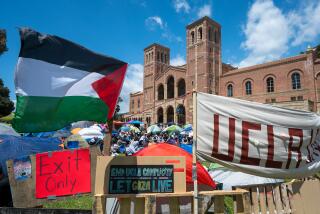Jewish Seminary a Bigger Draw Than Expected
- Share via
The first religious school on the West Coast to offer complete rabbinical training will open soon at the University of Judaism, a historic--and initially controversial--step expanding the spiritual and academic strength of U.S. Judaism beyond its traditional East Coast base.
Three times as many seminarians as were initially expected will begin their first classes the day after Labor Day at the Ziegler School of Rabbinic Studies on the university campus atop Sepulveda Pass, leading to the first ordinations in 1999.
The University of Judaism announced one year ago that a $22-million anonymous grant would allow its rabbinical school to expand into a full-fledged seminary in the Conservative wing of Judaism.
With nearly 500,000 Jews in the Los Angeles area--the second-largest U.S. Jewish community--Southern California Jewry has seen the step as a “coming of age” for the region’s religious and community standing.
Heretofore, Conservative rabbinical candidates could spend the first two years at the University of Judaism but then had to go to New York, plus spend a year in Jerusalem, to complete their six-year studies. Similar requirements are still in place for future rabbis in the Reform and Orthodox branches, who may start their studies at schools in Los Angeles but must go east to complete them.
The Los Angeles school’s announcement “was a controversial move in some circles, and we didn’t know how it would play,” said Rabbi Daniel Gordis, dean of the Ziegler School and a vice president of the university.
Officials of the Jewish Theological Seminary of America in New York--then the only full-scale U.S. seminary for Conservative rabbis--reacted coolly when the University of Judaism announced it would become a West Coast alternative.
New York officials were partly troubled because they learned the news through the media, a spokeswoman for the Jewish Theological Seminary said.
Rabbi Ismar Schorsch, chancellor of the New York school, told a Jewish newspaper in September that opening a second school for Conservative rabbis could prompt divisions within Conservative Judaism, which already has a delicate task taking a central path between Orthodox Judaism’s emphasis on traditional Jewish law and ritual and the contemporary approach of Reform Judaism.
Gordis said relations with the New York seminary have since improved. “By the time of the annual meeting of Conservative rabbis in May, the Jewish Theological Seminary had publicly welcomed the school,” he said.
“We wish them well,” the spokeswoman for the New York seminary said Friday.
Administrators of the school beside Mulholland Drive initially thought they would have a dozen students for starters this fall.
But 34 students, 16 of them women, enrolled in the first- and second-year classes in what will be a highly compressed, four-year curriculum.
“We are deeply gratified at the response,” Gordis said.
One appealing feature for prospective students of the expanded Ziegler School is the shorter time frame it will take to become a rabbi. Instead of the usual six years back East, the Ziegler School will conduct classes year-round to allow students to complete studies in four years.
“It’s a lot harder when you are in your mid-30s to enter a six-year school,” said first-year student Hesha Abrams. A former trial lawyer and mediator for business disputes in Portland, Ore., Abrams, 37, had to persuade her husband and two children to relocate to Los Angeles for the years she will spend in the seminary.
“I feel very blessed,” said Abrams. “This program is very impressive--strong academically and yet with room for self-expression.”
She said she likes the multiculturalism of Los Angeles. “Coming here, I feel like a citizen of the world,” Abram said. “I want to study interfaith relations.”
Another incoming student, Ron Hauss, 47, recently began serving as part-time rabbi of Hollywood Temple Beth El.
Hauss is returning for his rabbinical degree and ordination after having functioned as a rabbi from 1976 to 1995 with a Santa Clarita congregation. He had started classes at the university’s rabbinical school in 1983, but said he could not go east to complete his studies because it would uproot his family.
Hauss said he did not see how the Reform and Orthodox wings of Judaism could long ignore the move in Conservative Judaism to establish a full-fledged, ordaining seminary in Los Angeles.
“This is quite a coup for the University of Judaism,” Hauss said.
Sources say the Ziegler School of Rabbinic Studies received the $22-million grant from the same Ziegler family foundation that established the school. It will not ordain its first rabbis until 1999 because a dozen students who completed two years last semester, and were previously committed to continuing studies at the New York seminary, were not given the opportunity to study a third and fourth year here, said Gordis, the dean.
“We wanted to make it clear that we had no thoughts of taking students away from Jewish Theological Seminary,” he said.
Nevertheless, the new Ziegler School attracted two East Coast transfers from Reform Judaism’s Hebrew Union College and two from Reconstructionist Rabbinical College, a seminary near Philadelphia serving the small, liberal Reconstructionist synagogue movement.
“The Ziegler School is creating a niche within the American Jewish spectrum as a place to become competent in the study of classic Jewish texts while being sensitive to the needs of contemporary Jews in modern America,” Gordis said.
“Students are looking for a community serious about Jewish tradition in a tolerant, pluralistic community,” he said.
More to Read
Sign up for Essential California
The most important California stories and recommendations in your inbox every morning.
You may occasionally receive promotional content from the Los Angeles Times.










